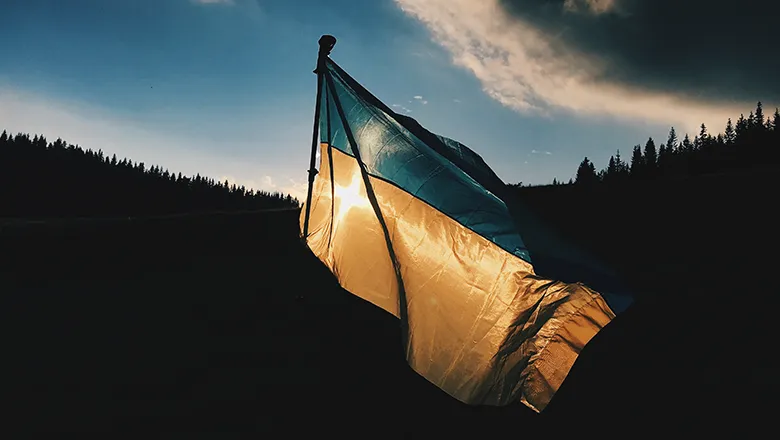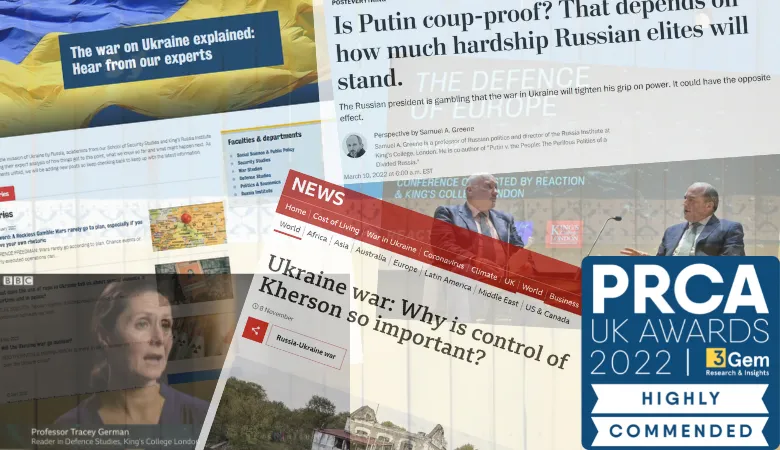As we approach a year since the invasion of Ukraine, the King's community continues to focus on the many impacts of the war and is directly supporting those displaced by the ongoing conflict.

Since President Putin ordered troops to invade Ukraine on 24 February 2022, King's academics and researchers have shared their expertise with the world to help enhance public understanding of the war and its many consequences. As a university, King's has also sought to directly help those displaced by the war through leading the higher education response to help students and academics from Ukraine continue with their education and research.
As we now approach the one-year mark since the invasion of Ukraine, the commitment of King's and our researchers continues around highlighting the effects of the conflict and supporting those whose lives have been so affected by it.
Sharing expertise and insights
Our academics are sharing their expertise regularly across media around the world and in the 12 months since war broke out, have appeared in more than 26,120 articles and broadcasts*.
Recent coverage has included Dr Mike Martin quoted in The Financial Times about the likelihood of a Spring offensive by Russia, Professor Sir Lawrence Freedman quoted on The Associated Press about troop losses in the battle for Bakhmut, Professor Michael Clarke quoted in The Sunday Times about President Putin's options, Dr Marina Miron quoted in The Independent discussing the use of tanks in the fighting, Vera Michlin Shapir interviewed on CNN.com explaining why The West needed to send more weapons to Ukraine and Professor Peter Neumann quoted in The Washington Post on the Europe's response to the conflict. Footage of damaged Russian tanks that was shared online by Rob Lee was also reported in Newsweek.

War and conflict have devastating and far-reaching effects that touch all aspects of life. Research into these impacts - from the consequences for those displaced by conflict, to the ramifications on the geo-political landscape, to the lasting effects on mental health - help the world understand how we may be able to limit these impacts and support those affected.– Professor 'Funmi Olonisakin, Vice President (International, Engagement & Service)
In the week war broke out, we started our own Ukraine Explained online series which is continually updated and now offers more than 45 informed and accessible articles on all the different aspects of the war and its many geopolitical consequences.
To mark the anniversary of the invasion, academics from King's Russia Institute shared their reflections on a year of conflict including what has changed for Ukraine, Russia and the wider world. And last Friday, the institute hosted an event to explore different aspects of the conflict and its consequences at the domestic and global levels which featured contributions from its academics and colleagues from the Department of War Studies .
On the date of the anniversary, 24 February, security analyst Dr Jill S. Russell will deliver a talk at our Strand campus about Ukraine, logistics and the future strategic landscape. On the same day the Centre for Grand Strategy at King's is publishing a new open access online journal focused on the war in Ukraine over the past year which includes 17 original contributions from academics and PhD students within the School of Security Studies. This includes articles looking at how much the conflict has affected food prices around the globe and whether Russia's global influence will continue to decline.
This week, King's also hosted a special screening of the final episode of the BBC documentary Putin vs The West, which includes contributions from Professor Sir Lawrence Freedman, King's Emeritus Professor of War Studies. And to connect with audiences around the world, in the coming days a special edition of the War Studies podcast will be published featuring Dr Marina Miron looking back at the year since the invasion of Ukraine.
The war has been an important focus of communications with our Alumni to show how the university is increasing awareness, promoting understanding and convening the major players to unpick the causes and potential outcomes of the conflict.
King's has also been offering support to all members of its community who might have been affected by the war in Ukraine, as well as other international conflicts across the world, through King's Counselling & Mental Health Support Service , KCLSU. its Employee Assistance Programme (EAP) and King's chaplaincy team.
It is with great sadness that we mark the first anniversary of the war in Ukraine. A world where wars of aggression continue to devastate the lives of individuals and nations is not the world we want for ourselves or for coming generations. Let us at King's commit ourselves to working for the justice and peace that is key to living into our commitment to make the world a better place.– Rev Ellen Clark-King, Dean of King's College London
Supporting Ukrainian students and researchers
Kings has worked in partnership to develop the University Sponsorship Model with Citizens UK, Ukrainian Sponsorship Pathway UK (USPUK), the Open University, Newcastle University and the University of Leicester. The University Sponsorship Model enables higher education institutions to implement the UK Government's Homes for Ukraine scheme and support Ukrainian students and academics to continue their studies and research.
So far more than 50 individuals have been sponsored by members of the King's community, including academic fellows, students who continue to study their degrees at Ukrainian universities online and recipients of our Sanctuary Scholarships.
The Language Centre in the School of Professional & Continuing Education (PACE) provided free Ukrainian online language courses to people taking part in the Sanctuary Programme. French language experts at King's also worked through the Circle U. Alliance to support refugee students continuing their education at universities in France and Belgium.
One of those who has been helped by the Sanctuary programme is Ukrainian university student Anna, who is hosted by Dr Jennifer Stevenson (Honorary Senior Lecturer and Clinical Pharmacist, Faculty of Life Sciences and Medicine) and her family. Jennifer and Anna have shared their experience and reflected on the many benefits of hosting.
Hosting has been incredibly rewarding. Our guest has demonstrated exceptional bravery and determination to succeed even in the most challenging of circumstances which reminds us daily of how fortunate we are and inspires us to take every opportunity we can.– Dr Jennifer Stevenson, Honorary Senior Lecturer and Clinical Pharmacist, Faculty of Life Sciences and Medicine
It has been a truly rewarding experience to work in partnership with the Open University, Newcastle University and the University of Leicester to develop the University Sponsorship Model as a cross-sectoral collaborative approach to resettling and supporting individuals impacted by the war in Ukraine. Our ambition is that the University Sponsorship Model can be scaled and replicated to deliver transformative educational opportunities and safe and legal pathways for displaced students and academics from across the world.– Dr Leonie Ansems de Vries, Reader in International Politics and Director of the King's Sanctuary Programme, King's College London






